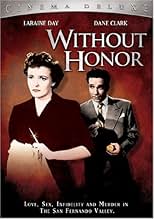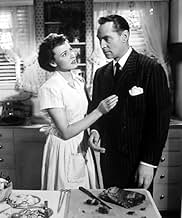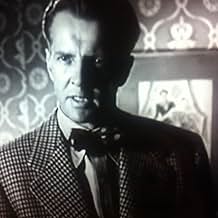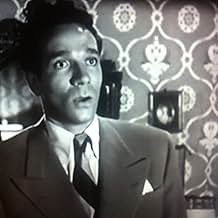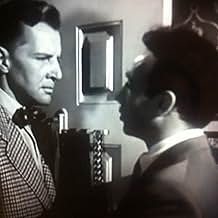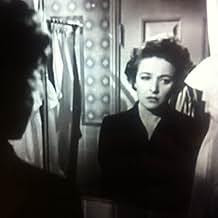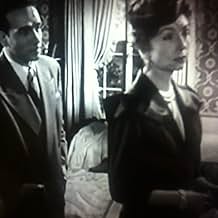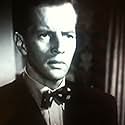Aggiungi una trama nella tua linguaJane Bandle has recently married, but Bill, her husband's brother, tries to wreck her marriage because Jane rejected his sexual advances before her marriage.Jane Bandle has recently married, but Bill, her husband's brother, tries to wreck her marriage because Jane rejected his sexual advances before her marriage.Jane Bandle has recently married, but Bill, her husband's brother, tries to wreck her marriage because Jane rejected his sexual advances before her marriage.
- Regia
- Sceneggiatura
- Star
- Premi
- 1 candidatura in totale
Marjorie Stapp
- Neighbor's Wife
- (as Margie Stapp)
Irving Pichel
- Narrator
- (voce)
- (non citato nei titoli originali)
Recensioni in evidenza
I saw this when I was 10, when movies were double features and the fare changed weekly. I only remembered it because I loved Day, not because of being an actress, but because she was Leo Durocher's wife and I was a Baseball nut. I saw it again recently on TCM. This movie defies a reason for being, except that the studios needed constant fodder and this film proves the point that it was often volume over content. We are still being crammed with movies that ask the same question, What Were They Thinking, but lack the old excuse.
Day's acting, consisting primarily from 'reacting', is an embarrassment on the same footing as the unlikely dialogue given to the rest of the cast. Her opening scene with Clark makes for great comedy as she goes thru a 360 degree range of reactions to his 25 or so separate avenues of dialogue, mostly questions she never answers. And he's oblivious to the strangeness of her conduct. From there it only gets worse.
It's hard to believe it's the same Day who shown so brilliantly in Mr. Lucky or a movie with such confusing plot turns, but unlike The Big Sleep, where you didn't notice or care.
Day's acting, consisting primarily from 'reacting', is an embarrassment on the same footing as the unlikely dialogue given to the rest of the cast. Her opening scene with Clark makes for great comedy as she goes thru a 360 degree range of reactions to his 25 or so separate avenues of dialogue, mostly questions she never answers. And he's oblivious to the strangeness of her conduct. From there it only gets worse.
It's hard to believe it's the same Day who shown so brilliantly in Mr. Lucky or a movie with such confusing plot turns, but unlike The Big Sleep, where you didn't notice or care.
The problems that may be inherent in the story were made worse because the then-still-somewhat-powerful arbiters of censorship gave the film a rough time. The objection, I would assume, resulted from the fact that the Laraine Day character is allowed to live and not 'pay for her almost-fatal-act-of-murder'. Day didn't always get a chance to grab the parts that lead to awards, but she is more than good in this one. Sorry to contradict one of the earlier writers on the piece, but the worst acting in the film, and the only truly awful performance, is the one by Agnes Moorehead, wearing an outfit that could have come from Ed Wood. This is far from an unwatchable film... it does have suspense...and the ending is surprising in denouement. It is forgotten, I admit, but this film did earn considerable attention in the news regarding its producers' fights to get it released without disastrous cuts. Thus, a moment in the censorship issues that were finally blasted apart by people like Otto Preminger.
I usually refrain from commenting on films because there are so many other reviewers out there...but seeing how this just has one review and a very negative, I felt I should offer my opinion.
I'll admit the first 20 or 30 minutes felt like a typical Hollywood pot-boiler. Cheating wife accidentally kills lover; will she get away with it; etc. After this set-up, the film becomes an onion - revealing new layers of characters' motivations and back-story.
Laraine Day stands out superbly as the cheating wife...whole scenes develop around her without her speaking, yet we know what's going on in her mind.
I have to agree with the other reviewer that I loved Steiner's score...but did feel it inappropriate at times. The performances on screen are very subtle and the music is anything but subtle.
I particularly enjoyed the second half of the film as characters acted against stereotypes.
The DVD I watched was from Geneon and featured an adequate transfer; not stellar, but much above average from the usual run-of-the-mill public domain stuff.
I'll admit the first 20 or 30 minutes felt like a typical Hollywood pot-boiler. Cheating wife accidentally kills lover; will she get away with it; etc. After this set-up, the film becomes an onion - revealing new layers of characters' motivations and back-story.
Laraine Day stands out superbly as the cheating wife...whole scenes develop around her without her speaking, yet we know what's going on in her mind.
I have to agree with the other reviewer that I loved Steiner's score...but did feel it inappropriate at times. The performances on screen are very subtle and the music is anything but subtle.
I particularly enjoyed the second half of the film as characters acted against stereotypes.
The DVD I watched was from Geneon and featured an adequate transfer; not stellar, but much above average from the usual run-of-the-mill public domain stuff.
Without Honor is a 1949 film directed by Irving Pichel and starring Laraine Day as an adulterous housewife in the Los Angeles burbs who has a sort of intervention conducted by her psychotic brother-in-law (Dane Clark) because he's getting even for spurning him and marrying his brother years before.
He arranges for Day and his brother (Bruce Bennett) to be home when Day's lover (Franchot Tone) and his wife (Agnes Moorehead) drop by so he can expose her and get his revenge. Just another sunny day in the burbs.
What Clark doesn't know is that earlier that afternoon Day and Tone had a big fight and break-up and when Day tried to kill herself with a shish-kabob skewer he accidentally fell on it while wrestling it away from her and stabbed himself to death. He's in the laundry room on the floor.
When Clark arrives, he taunts Day, who is about to skip out in a taxi. He goes on and on about how she got him drunk on beers when he was 18 and he made a fool of himself and he's never gotten over it. Day has other things on her mind. Moorehead shows up with no idea why she's there. Bennett comes home from work. Tone is a no-show.
Moorehead has a chat with Day and tells her she knows all about it ... and all his previous dalliances. Bennett pitches a fit, so Day runs into the bathroom and tries to slice her wrists with a razor blade. They call an ambulance but by then they discover that Tone isn't in the laundry room. Keep that ambulance a-comin'.
Everyone in the cast is quite good even if the film is a tad over-the-top. Certainly an interesting post-war take on placid suburbia. Gorgeous cars! Tone drives a 1948 Studebaker convertible and Moorehead drives a 1948 Packard sedan.
He arranges for Day and his brother (Bruce Bennett) to be home when Day's lover (Franchot Tone) and his wife (Agnes Moorehead) drop by so he can expose her and get his revenge. Just another sunny day in the burbs.
What Clark doesn't know is that earlier that afternoon Day and Tone had a big fight and break-up and when Day tried to kill herself with a shish-kabob skewer he accidentally fell on it while wrestling it away from her and stabbed himself to death. He's in the laundry room on the floor.
When Clark arrives, he taunts Day, who is about to skip out in a taxi. He goes on and on about how she got him drunk on beers when he was 18 and he made a fool of himself and he's never gotten over it. Day has other things on her mind. Moorehead shows up with no idea why she's there. Bennett comes home from work. Tone is a no-show.
Moorehead has a chat with Day and tells her she knows all about it ... and all his previous dalliances. Bennett pitches a fit, so Day runs into the bathroom and tries to slice her wrists with a razor blade. They call an ambulance but by then they discover that Tone isn't in the laundry room. Keep that ambulance a-comin'.
Everyone in the cast is quite good even if the film is a tad over-the-top. Certainly an interesting post-war take on placid suburbia. Gorgeous cars! Tone drives a 1948 Studebaker convertible and Moorehead drives a 1948 Packard sedan.
Watch carefully. Lorraine Day has very few lines in this movie. She did most of her acting by facial expressions responding to the other actor's long monologues (Clark & Moorehead). Pichel got the best out her.
Lo sapevi?
- QuizThis film offers a rare glimpse at a contemporary 1949 television set, a bulky table model with a ten-inch rectangular screen, which commonly was required to be "set up" by qualified technicians who also needed to install an antenna on the roof before proper reception could be achieved. Commercial television broadcasts had begun in Los Angeles two years earlier in 1947 on KTLA (Channel 5).
- BlooperJane is said to have broken a heel In the fall that caused her to miss her escape by bus, but as she picks up a broken heel off the ground and carries it with her, the heels on the shoes on both her feet remain intact and attached.
- Citazioni
Fred Bandle: [picking Jane up on the dusty road, oblivious to her foiled attempt at escape] Where were you? Out for a walk? You busted a heel, huh? Well you shouldn't wear heels on a street like this.
I più visti
Accedi per valutare e creare un elenco di titoli salvati per ottenere consigli personalizzati
Dettagli
- Tempo di esecuzione
- 1h 9min(69 min)
- Colore
- Proporzioni
- 1.37 : 1
Contribuisci a questa pagina
Suggerisci una modifica o aggiungi i contenuti mancanti

